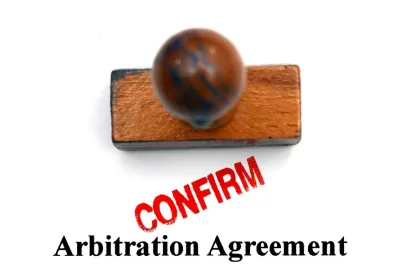This spring has seen a new crop of state court decisions addressing the enforceability of arbitration agreements in New Jersey. In Roach v. BM Motoring, LLC, A-69-15 (Mar. 9, 2017), the New Jersey Supreme Court held that a defendant’s decision not to advance the American Arbitration Association’s (AAA) fees was a material breach of an arbitration agreement that precluded the party from enforcing it. In two recent Appellate Division decisions, different panels reached different conclusions regarding the enforceability of arbitration agreements. In Columbus Circle NJ LLC v. Island Construction Co., A-1907-15T1 (Mar.13, 2017), the court enforced an arbitration agreement against a property owner who had been represented by counsel but nevertheless claimed that his agreement did not clearly state that he was waiving the ability to have disputes decided by a jury. By contrast, in Snap Parking, LLC v. Morris Auto Enterprises, LLC, A-4733-15T4 (Mar. 27, 2017), the court refused to enforce an arbitration agreement against a business that claimed that the language regarding the waiver of the ability to bring a class action was confusing. Given the importance of the issue and the two panels’ fundamentally different interpretations of Atalese v. U.S. Legal Servs. Grp, L.P., 219 N.J. 430 (2014), it would not be surprising should the New Jersey Supreme Court weigh in on the issue yet again.
Roach v. BM Motoring, LLC
In Roach, the New Jersey Supreme Court reversed the Appellate Division and trial court, both of which had enforced an arbitration agreement against consumers who had filed a putative class action against an automobile dealership. Before filing suit in court, the plaintiffs had tried to commence arbitrations before the AAA. The AAA refused to accept the arbitrations because the defendant had failed to respond and comply with AAA rules regarding the payment of fees. Although it did not disclose its reasoning to the plaintiffs or the AAA, the defendant believed that its agreement required application of AAA rules but not administration by the AAA. The agreement provided:
[t]he arbitration shall be conducted in accordance with the rules of the [AAA] before a single arbitrator, who shall be a retired judge or attorney. Dealership shall advance both party’s [sic] filing, service, administration, arbitrator, hearing, or other fees, subject to reimbursement by decision of the arbitrator.
After the AAA refused to accept the arbitrations, the two plaintiffs filed a class action in court, which the defendant then moved to dismiss due to the arbitration clause. The trial court found that the parties intended to arbitrate their claims and directed them to try to reinstate the AAA arbitration and to comply with its rules. After the AAA reinstated the arbitration, the trial court dismissed the complaint, after which the plaintiffs appealed. The Appellate Division affirmed, finding that the dealership had not materially breached or waived its right to enforce the arbitration agreement.
The Supreme Court granted review and ultimately reversed, finding that the defendant’s interpretation of the arbitration agreement contradicted its plain language. The Court reasoned that, because the agreement required that arbitrations be conducted “in accordance with the rules of the [AAA],” the dealership should have anticipated that claims would be filed with the AAA. The Court held that categorically and repeatedly refusing to advance the AAA arbitration fees was a material breach of the agreement and the duty of good faith and fair dealing. But the Court eschewed a “bright-line rule” and limited the decision to its facts: “whether a party’s refusal or failure to respond to a written arbitration demand within a reasonable time period constituted a material breach of an arbitration agreement that precludes enforcement by the breaching party must be made on a case-by-case basis after considering the agreement’s terms and the conduct of the parties.” It is safe to assume, however, that the plaintiffs’ bar will look long and hard for creative ways to invoke this decision in response to any number of innocuous “breaches” of an arbitration provision.
Columbus Circle NJ LLC v. Island Construction Co.
Columbus Circle involved a dispute over the construction of a $2 million home in which the plaintiff owner unsuccessfully tried to avoid his arbitration agreement. The parties, each represented by counsel, had negotiated the provisions in a Standard Form AIA Agreement Between Owner and Contractor, including a dispute resolution mechanism. The owner chose “Arbitration pursuant to Section 15.4 of AIA Document A201-2007” over “Litigation in a court of competent jurisdiction” or “Other.” The arbitration provision in Section 15.4 provided that, “unless the parties mutually agree otherwise,” arbitrations would be administered by the AAA in accordance with its Construction Industry Arbitration Rules. The parties negotiated and revised other terms of the agreement but did not change the dispute resolution selection.
After a dispute arose, the contractor demanded arbitration. The owner responded by filing a complaint in the Law Division and arguing that the contract “did not ‘indicate[ ] that [he] was waiving [his] right to file suit against the Defendants in Court.’” The trial court compelled arbitration and the owner appealed.
The Appellate Division rejected the owner’s arguments and affirmed, finding that the owner had chosen the “arbitration” option with full knowledge that it was a substitute for the ability to file suit in court. The court distinguished Atalese, not only because the dispute arose from a $2 million construction agreement negotiated between sophisticated parties, but also because that agreement expressly advised of the difference between resolving disputes in court and in arbitration. The court also rejected the argument that Atalese requires agreements to give explicit notice of the loss of the right to a jury trial, explaining that Atalese required only that the arbitration clause “advise[ ] the parties they were waiving the fundamental right to seek relief in court, without requiring it advise them of all the component rights encompassed in that waiver.” Because the right to a jury trial is but one of many components of a court action, the court did not believe that it was practical—let alone essential—to require each component to be itemized. It also observed that, if the owner had any questions, he could have consulted the AAA rules, which were cited by name in the agreement.
Snap Parking, LLC v. Morris Auto Enterprises, LLC
In contrast, in Snap Parking a different panel of the Appellate Division declined to enforce an arbitration provision because it believed Atalese required it to ignore the presumption in favor of arbitration by interpreting any ambiguity in the agreement against the drafter. The plaintiff operated an airport parking business that purchased two shuttle vans from the defendant dealership. When a dispute arose about the servicing of the vehicles, the plaintiff filed a putative class action in state court. The dealership moved to compel arbitration because the purchase order provided that “the parties . . . agree to arbitrate any claim, dispute, or controversy” arising from the transaction, including statutory claims. The agreement also recited that the parties were waiving the ability “to maintain other available resolution processes, such as a court action,” that the parties were waiving the ability to pursue any claims . . . as a class action arbitration,” that arbitrations “would be administered by AAA under its Commercial Arbitration Rules,” and that the dealership would advance the AAA’s filing and administrative fees, subject to potential reimbursement by decision of the arbitrator. The agreement further stated that the parties did not intend “to arbitrate class actions” and ended with a notice that the agreement “LIMITS YOUR RIGHTS, INCLUDING YOUR RIGHT TO MAINTAIN A COURT ACTION.”
The court concluded that, under Atalese, the arbitration agreement was not enforceable because its terms were unclear. According to the court, the language purporting to require arbitration of “any claims” was inconsistent with other language, including the waiver of the right “to pursue any claims . . . as a class action arbitration” and the parties’ stated intent “not to arbitrate class actions.” The court concluded: “[s]ince the Agreement does not explicitly state it bars class actions altogether, we conclude the ‘class action arbitration’ waivers were not stated with sufficient clarity to constitute a complete abandonment of court proceedings to pursue a class action.”
The Snap Parking court presumably believed that the agreement should have stated that class actions could not be brought “whether in court or in arbitration.” But the court gave no reason for conflating the language regarding the scope of the agreement and language regarding the procedures to be used in arbitration, let alone for ignoring explicit language whereby the parties “waive their rights to maintain . . . a court action” and that consumer fraud claims would be arbitrated rather than litigated. Rather, the court interpreted Atalese as requiring that arbitration agreements contain no potential for any ambiguity. That not only misreads Atalese but also ignores the strong presumption in favor of arbitration, and encourages creative lawyers to mine arbitration provisions for any possible inconsistencies and ambiguities in an effort to avoid arbitration.
Best Practices
Although the law in this area continues to develop, the Roach, Snap Parking, and Columbus Circle decisions suggest that businesses looking to utilize arbitration agreements in New Jersey courts should consider the following:
-
Roach highlights the importance of avoiding any arguable breach of an arbitration agreement. Businesses should now anticipate breach arguments (and attempts to manufacture them), should respond when appropriate to arbitration demands and reasonable inquiries regarding the arbitration process, and should retain all correspondence with claimants. Businesses should also consider providing a specific address for arbitration-related correspondence to avoid factual disputes—whether real or contrived—over whether claimants have given proper and sufficient notice of the commencement of an arbitration.
-
Any business that wishes to incorporate the AAA’s rules without using its arbitrators or incurring its fees and charges should make sure that its arbitration provision clearly states that the AAA will not administer the arbitration, even if the AAA’s rules would otherwise permit such a proceeding to be brought.
-
Arbitration provisions, particularly those with class action waivers, should explain the nature of the parties’ agreement and state that the ability to bring a court action is being waived. As Snap Parking suggests, certain courts in New Jersey may scrutinize the language in such provisions for any arguable inconsistencies or ambiguities. But insisting on absolute perfection in drafting defeats the essential purpose of such provision—to ensure that disputes between the parties will be resolved more quickly and cost-effectively than in the courthouse.
-
In the event a claimant files suit in state court despite an agreement to arbitrate, businesses should consider whether the action can be removed to federal court, which as a general rule is more respectful of and less hostile to arbitration agreements.






 />i
/>i
